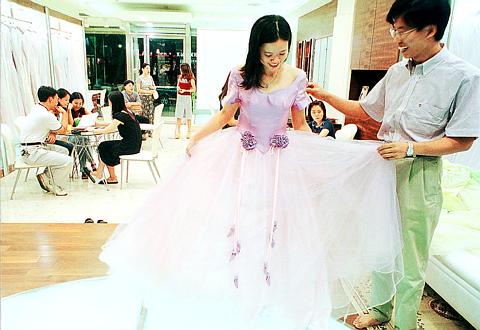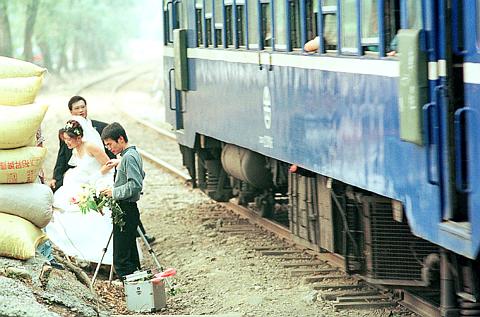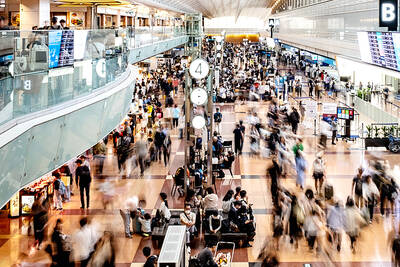After dating for more than three years, Jason Huang (
"I purposely chose Sept 19 to be my wedding date," said the soon-to-be Mrs Huang. "Not only because the Chinese lunar calendar says it's the perfect date for weddings, but also because the date itself has a hidden meaning. In Chinese, the date 9/9/99 sounds close to the words for long, long, long, long, implying `long-lasting' and that is believed to bring good luck to couples married on that date. But since 9/9/99 is the last day of Ghost Month, the next best date is 9/19/99." Moreover, in the Chinese zodiac, next year is a dragon year, perceived to be the best sign out of all the twelve signs of the zodiac, luring many young couples to get married this year in order to have a dragon baby next year.
Huang and Ku are just one of thousands of couples in Taiwan planning to get married on that date. According to the Lin Li Wedding Studio (林莉婚紗), the store will have to handle more than 70 weddings on that date alone. The Lai Lai Sheraton Hotel (來來大飯店) even said all their banquet rooms were fully booked throughout the year as it's the last year of the century.

PHOTO: CHEN CHENG-CHANG, TAIPEI TIMES
From the reservation side, Li said the wedding industry is entering its high season after today, Sept 9, the last day of Ghost Month and an inappropriate time to have wedding ceremonies.
"According to Chinese culture, Sept 9 expresses the words 9999, which means the marriage will be very long-lasting. But, according to the Lunar Calendar, Sept 9 is July 31 and not a good day for weddings so that people pick Sept. 19 to replace it, since that date sounds closest to `9999' in Chinese" said Anna Chen (
Good year for industry

PHOTO: CHEN CHENG-CHANG, TAIPEI TIMES
This year looks to be a good harvest year compared to last year for the wedding industry. A large part of the reason is because this is the last year of the century. Another reason is that last year, the Tiger year, was deemed by Taiwanese people as "a bad year" for getting married.
According to the Ministry of the Interior, 145,000 couples were married in 1998, a sharp decline from the 168,000 couples married in 1997. "From these figures, you can see why the industry had a rough ride last year. But, it will change this year. We expect that the number of couples getting married to rebound to 1997's level or even beyond that this year," said Tsai Ching-hua (
Given that nearly 150,000 couples marry per year in Taiwan and the average wedding cost per couple is around NT$500,000, the industry involves business of nearly NT$75 billion per year. In the wake of the high booking rate, Lin said sales this year are expected to increase by at least 20 percent.
The increasing number of newly marrying couples certainly bodes well for the industry, particularly the bridal art studio business, providing studio photography services, make-up and clothing for weddings, and the hotel business, offering catering and reception services.
According to the Taipei Photography Association (
On average, the cost for a set of bridal services is around NT$40,000 to NT$60,000 per couple, but customers usually pay more than that. Grace Zhao who was married in June speaks of her experience.
"We intended to pay only NT$36,000 for the service but it ended up costing NT$100,000," said Zhao. "The NT$36,000 was the minimal charge for the service and that gives you only 30 free photos. However, our photographer took nearly 200 photos of me and my husband, tempting us to buy more than 30 pictures. We couldn't resist the temptation and purchased 142 pictures at the end, with every additional picture costing NT$850," said Zhao.
Although some people may think these bridal studios suck a brides' money dry, Tsai said that profitability in his business has been shrinking the last few years, reduced from more than 20 percent profitability 10 years ago to under 15 percent now, due to fierce competition. Only one third of stores actually realize big profits.
"Taking Chung Shan North Road (
She even joked that store owners used to greet each other with the question "how's your business doing? Now, the question has changed to whose store is going to shut down?" The large number of wedding studios has been attributed to an influx of investment made by reputable photographers or style designers in the industry a couple of years ago as they saw the business as being very lucrative.
However, "good photographers and good designers usually are not good businessmen," said Tsai. "We have seen many once top photographers or designers stop improving their technique after becoming bosses and their studios soon disappeared from the market." In addition to excellent technique, there is another underlying requirement for a studio to survive in the present market; that is customer service. Tsai held up an example of how her sales people work to optimize their service quality.
In her experience, many couples and their parents will have different expectations about how their wedding should be held and what they should wear, and usually these disagreements will develop into serious arguments. "How to ease these tensions is a big challenge and that is how we impress our customers with our customer service," said Tsai.
"One time, a couple came in to try on wedding clothes. The groom disliked the dress the bride was putting on and let it out. It was just a light quarrel at the beginning but soon it turned into a serious fight. Worse, the bride started crying. Our sales girl saw that. She went out to buy a bundle of roses, and gave it to the groom, telling him to give the flowers to the bride. Of course, it worked. The bride stopped crying."
Riding high
Banquet business hotels and restaurants are expected to ride high this year. According to the Lai Lai Hotel, the income generated from wedding banquets accounts for 55 to 60 percent of the hotel's total revenue.
On average, the cost for a wedding banquet is about NT$10,000 per table, which can sit 10 people, in a lavish restaurant, NT$20,000 per table in a five-start hotel, and only NT$5,000 per table when the banquet is held on the sidewalk. No matter where the banquet is held, there is always an additional 10 percent service charge.
In light of the arrival of high season starting in September, many extravagant banquet places are already fully booked. The Lai Lai Hotel is booked until next March.
Hai Pai Wang Restaurants (
He expects that the peak will fall in December, especially on Dec. 30 and 31, the last couple of days in the 20th century.
Some may be curious about how much a wedding costs is Taiwan, including wedding photos, wedding wear, engagement receptions, wedding banquets, and gifts, (usually cakes, given to friends and relatives). According to Ching-hua studio's Tsai, if the reception is held in a three-or four star hotel, the average cost is NT$50,000 per couple. If it's in a five-start hotel, it costs NT$1 million. Nearly 60 percent of expenses will be spent on the banquet.
There is no need to panic about the cost for those who plan to get married. Usually, couples can make a profit from their weddings by accepting "red envelopes". Taking Grace Zhao as an example, she spent NT$800,000 on her wedding, but received NT$900,000 in red envelopes.
She also said the average cost for having a guest attend the banquet is around NT$1,600 to NT$1,800. "That means if your guests give you a NT$2,000 red envelope, you will make a profit." Obviously, from a purely business perspective, having a wedding banquet is not a bad investment for couples to make.

CHIPMAKING INVESTMENT: J.W. Kuo told legislators that Department of Investment Review approval would be needed were Washington to seek a TSMC board seat Minister of Economic Affairs J.W. Kuo (郭智輝) yesterday said he received information about a possible US government investment in Taiwan Semiconductor Manufacturing Co (TSMC, 台積電) and an assessment of the possible effect on the firm requires further discussion. If the US were to invest in TSMC, the plan would need to be reviewed by the Department of Investment Review, Kuo told reporters ahead of a hearing of the legislature’s Economics Committee. Kuo’s remarks came after US Secretary of Commerce Howard Lutnick on Tuesday said that the US government is looking into the federal government taking equity stakes in computer chip manufacturers that

NORTHERN STRIKE: Taiwanese military personnel have been training ‘in strategic and tactical battle operations’ in Michigan, a former US diplomat said More than 500 Taiwanese troops participated in this year’s Northern Strike military exercise held at Lake Michigan by the US, a Pentagon-run news outlet reported yesterday. The Michigan National Guard-sponsored drill involved 7,500 military personnel from 36 nations and territories around the world, the Stars and Stripes said. This year’s edition of Northern Strike, which concluded on Sunday, simulated a war in the Indo-Pacific region in a departure from its traditional European focus, it said. The change indicated a greater shift in the US armed forces’ attention to a potential conflict in Asia, it added. Citing a briefing by a Michigan National Guard senior

POWER PLANT POLL: The TPP said the number of ‘yes’ votes showed that the energy policy should be corrected, and the KMT said the result was a win for the people’s voice The government does not rule out advanced nuclear energy generation if it meets the government’s three prerequisites, President William Lai (賴清德) said last night after the number of votes in favor of restarting a nuclear power plant outnumbered the “no” votes in a referendum yesterday. The referendum failed to pass, despite getting more “yes” votes, as the Referendum Act (公民投票法) states that the vote would only pass if the votes in favor account for more than one-fourth of the total number of eligible voters and outnumber the opposing votes. Yesterday’s referendum question was: “Do you agree that the Ma-anshan Nuclear Power Plant

ENHANCED SECURITY: A Japanese report said that the MOU is about the sharing of information on foreign nationals entering Japan from Taiwan in the event of an emergency The Ministry of Foreign Affairs yesterday confirmed that Taiwan and Japan had signed an agreement to promote information exchanges and cooperation on border management, although it did not disclose more details on the pact. Ministry spokesman Hsiao Kuang-wei (蕭光偉) said the ministry is happy to see that the two nations continue to enhance cooperation on immigration control, in particular because Taiwan and Japan “share a deep friendship and frequent people-to-people exchanges.” “Last year, more than 7.32 million visits were made between the two countries, making it even more crucial for both sides to work closer on immigration and border control,” he said. Hsiao